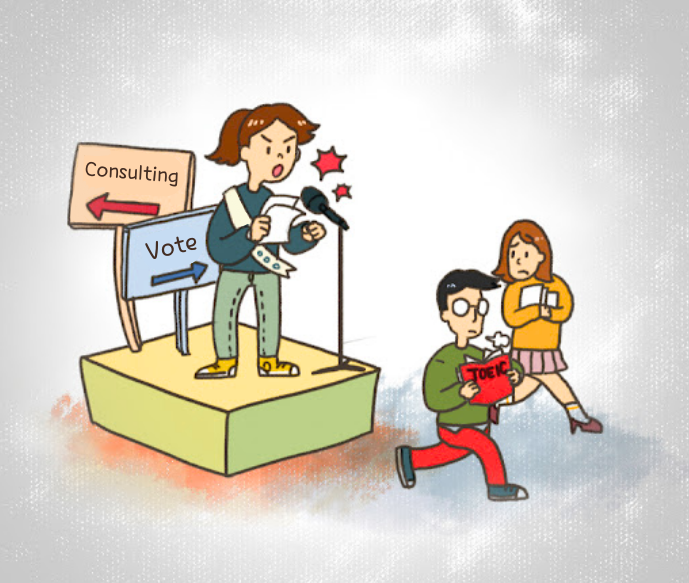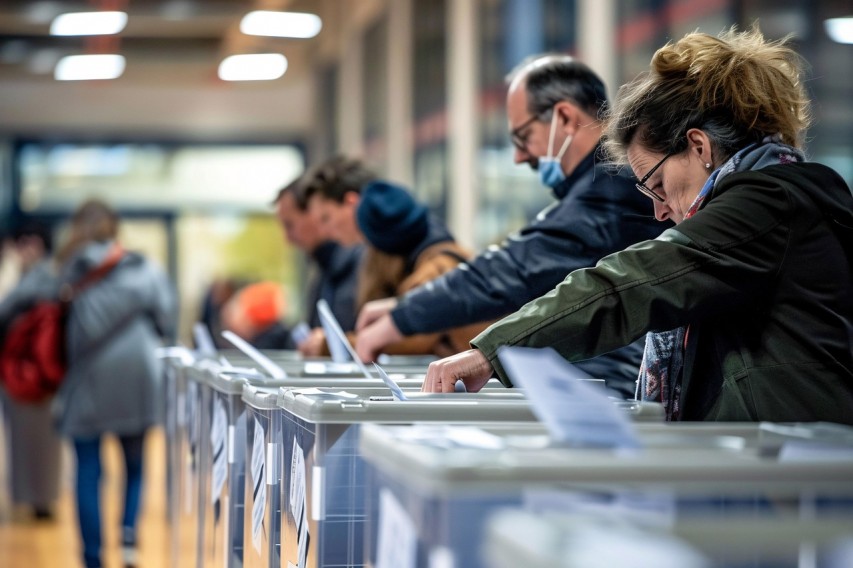[Opinion] Student Autonomy? Who Cares.
Students at Kyung Hee University (KHU) remain disinterested in student governance—a fact clearly reflected in the results of the recent Seoul Campus General Student Association (GSA) by-election held in March.
Due to the absence of registered candidates for the 2025 Seoul Campus GSA regular election, the position remained vacant until March. This vacancy was eventually filled by KnocKH, the sole candidate in the by-election. Even then, low voter turnout nearly prevented the election results from being validated.
According to election rules, a minimum voter turnout of 50% is required to count the vote. As KnocKH initially failed to meet this threshold, the voting period was extended by two additional days. The ballot box was nearly left unopened—but in the end, turnout narrowly surpassed the requirement, reaching 50.7%.
KHU students are becoming less willing to take part in shaping their own autonomous student society—not just the voters, but also the University media outlets and election candidates. Perhaps it is time to reflect on why.

Indifference to student autonomy
Photo: The Dandae Newspaper (dknews.dankook.ac.kr)
Limited Student Media Coverage
One possible reason for the low voter turnout may be less media coverage of the election. A comparison between the recent by-election and the Global Campus GSA election held last November, which met the turnout requirement on schedule, reveals a difference in coverage by the various student media outlets at KHU.
During the Global Campus election, KHU media outlets published a total of 23 pieces of content: five English articles from The University Life, six video reports and five card news pieces from Voice of University (V.O.U.) Global Campus branch, and eight Korean articles from Daehak Jubo. Furthermore, two public hearings that allowed for in-depth discussions between the candidates were held within a week, each lasting around 3 hours and 20 minutes.
In contrast, media coverage during this by-election was lower. During March’s election, student media outlets published a total of 16 pieces of content: seven English articles from The University Life, four video reports and one card news post from the V.O.U. Seoul branch, and four Korean articles from Daehak Jubo. The public hearing was also shorter—a single session that lasted one and a half hours.
As critical information sources for the community, insufficient coverage from student media likely contributed to low participation in the KHU election. This coverage gap threatened the GSA's representation and left the community without even an opportunity to understand why.
A Passive Election Campaign
Subdued campaign efforts by the GSA candidates and their supporters may also have been a contributing factor to the low turnout—a point that becomes apparent when comparing the Global Campus GSA election with the recent by-election.
During the Global Campus election, banners outlining the candidates’ electoral promises were displayed on the whole campus, and the campaign supporters actively encouraged the students to vote. The supporters competed intensely, not allowing the other to gain the upper hand in the smallest details. At one point, they even engaged in a public shouting match, each trying to make their electoral promises heard over the other.
The atmosphere at the Seoul Campus by-election was noticeably different. During the campaign period, it was hard to spot a single campaign supporter. The number of banners was noticeably less compared to the overwhelming display at November’s Global Campus election.
One telling incident involved the electoral promise booklet — a key reference I had to obtain when writing this article. During this period, obtaining a campaign booklet was nearly impossible, as it was difficult to find any campaign supporters in person. For those writing articles about the election, the only way to access the booklet was through fellow reporters who luckily got one. The lack of accessible materials—even for individuals actively trying to gather information—reflects just how passive the campaign effort made throughout the election.
Indifferent Voters
Lack of media coverage and campaign effort aside, March’s by-election raises the question of whether some students no longer see voting as meaningful. When the voting period was extended by an additional day due to insufficient turnout, reporters expressed their frustration in the editing room. They shared dismissive remarks they had heard about voting, such as, “I did not vote because I hate the GSA,” or “I did not vote because my one vote is not going to change anything.” While it cannot be assumed that all students share these views, it does suggest that at least some believe their contributions do not matter even slightly in society.
Some students said they did not have time to participate in the election; however, that is not a valid excuse considering March’s voting process. Although less extensive than during the Global Campus election, related information was still made available through various platforms. Students were able to access details—such as the schedule, voting method, and highlights of the electoral promises—through content provided by student media outlets, the ERC, and KnocKH.
Moreover, online voting helped reduce the burden on voters. Using the voting application, KHU students could cast their vote in just 30 seconds by logging in with their student identification number. This means that within a few minutes, a voter could have easily reviewed the candidates’ information, decided, and submitted their vote.
Photo: Pixabay (pixabay.com)
The roles of various student bodies were not fully fulfilled in March’s election. The student media needed to provide more opportunities for public dialogue, and the candidates needed to have shown themselves in public more actively. As for voters, all they had to do was look up the candidates and cast their votes.
Thus, regarding the causes of such poor participation, now is the right time to ask ourselves: are we truly doing our part to participate in the elections and uphold our autonomy, or have we lost sight of the value of being part of it?
Student autonomy—who really cares anymore?
There are no registered comments.
I agree to the collection of personal information. [view]


